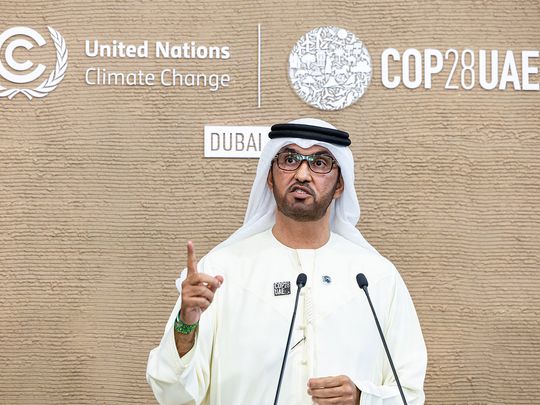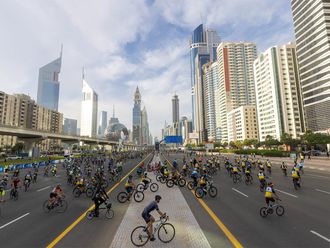
Dubai: COP28 President Dr Sultan Al Jaber on Sunday called on negotiating parties at the United Nations climate conference in Dubai to work harder, be flexible and accept compromise to reach a final deal on tackling climate change.
Al Jaber spoke about including wording for the first time on the future of fossil fuels. “Time is ticking. Failure is not an option,” said Dr Al Jaber.
The two-week conference, expected to close on Tuesday, December 12, will assess where the world stands on climate change and what needs to happen next. The Global Stocktake (GST) text – the most crucial document – is set to be finalised by the negotiators, and the crunch point is what the final text will – or will not – say about dealing with fossil fuels.
A coalition of more than 80 countries, including the United States, the European Union, and small island nations, pushed for a deal that included language to ‘phase out’ oil, gas, and coal.
However, countries with fossil fuel interests are likely to be pushing back against using fossil fuels in the final text.
‘Negotiations must move faster’
Dr Al Jaber also said negotiations are progressing well but must move faster.
“I want to break the silence. I want to talk people-to-people. I want everyone to be ready to accept compromise, to rise above self-interest, and to remind everyone what is really at stake here,” said Al Jaber.
The COP28 President said he had called all parties for a majlis [meeting] on Sunday afternoon, asking them to come forward with consensus solutions. “National circumstances will be taken into consideration; we will acknowledge everyone’s concerns,” said Dr Al Jaber during his address to the media.
Draft text on fossil fuels
On Friday, a new draft of the COP28 agreement was published by the United Nations Framework Convention on Climate Change (UNFCC), outlining four options for the transition to clean energy. The possibilities, still under negotiation, propose that the final agreement should urge countries to:
‘Take further action in this critical decade towards a phase-out of fossil fuels in line with the best available science.’
‘Phase out fossil fuels in line with the best available science, the IPCC’s 1.5C pathways, and the principles of the Paris Agreement.’
‘Phase out unabated fossil fuels, recognising the need for a consumption peak in this decade and emphasizing the energy sector’s shift away from fossil fuels well before 2050.’
‘Phase out unabated fossil fuels rapidly, aiming for net-zero CO2 in energy systems by or around mid-century.’
Additionally, an option suggests a ‘rapid phase-out of unabated coal power this decade and an immediate cessation of permitting new unabated coal power generation’ or no text on the issue.
The draft also presents an option to call for ‘the phase-out of fossil fuel subsidies not addressing energy poverty or just transition’ or include no text.
Most critical phase
As the climate conference reaches its most crucial phase, climate experts have emphasised the need for all parties to unite in the best interests of the planet’s future, with science as a central and essential pillar.
Anu Chaudhary, Partner and Global Head, ESG Practice, Unique Consultech, said: “COP28 is entering its final phase, and the urgency to act has never been more pressing. Three clear tasks are emerging: amicably phasing out fossil fuels, fostering an enabling ecosystem for climate finance, and reversing the damage already done to our biodiversity through deforestation and land degradation.”








